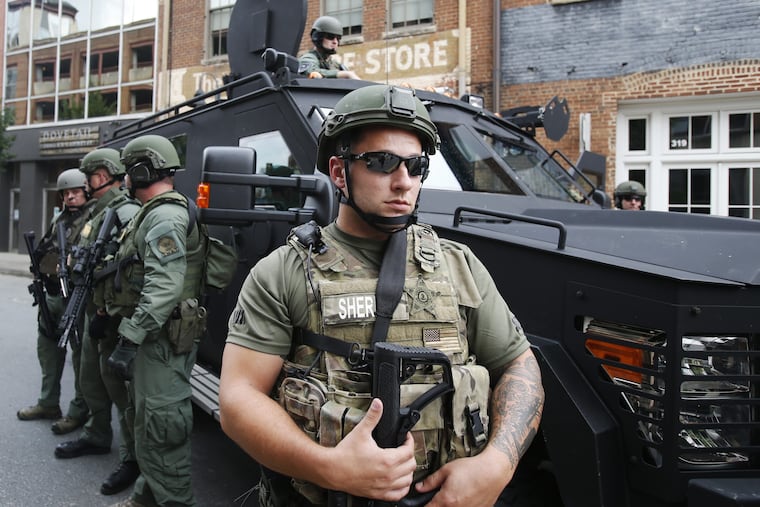I convinced the courts that Nazis have a right to free speech decades ago. I’d do it again today. | Opinion
These newly energized critics of the First Amendment are wrong.

In today's heated political climate, many argue that the protections of the First Amendment should not extend to hate speech and to the white nationalist movement that demonstrated a year ago in Charlottesville and last weekend in Washington, D.C.
The people who make this argument are wrong to do so. Let me explain why.
Just over 40 years ago, I led a team of ACLU lawyers that defended the First Amendment right of American Nazis to hold a demonstration in Skokie, Illinois, a community with a high percentage of Jews and large number of Holocaust survivors. At the time, the criticism of our representation was deafening.
I was angrily asked, "How can you, a Jew, represent Nazis?"
And, the ACLU was repeatedly challenged: "How can the ACLU justify its representation of a group engaged in such bigoted and offensive advocacy?" (Thousands of ACLU members resigned at the time.) Critics contended that the First Amendment should not protect Nazis.
>> READ MORE: Charlottesville revealed an ugly underbelly that remains today | Editorial
But the case was won, a peaceful demonstration followed and freedom of speech was protected.
The Skokie case became a textbook example of the universal protections the First Amendment provides to all political and social advocacy, including speech we hate. In the decades that followed, I had the privilege of teaching law students at Ohio State that the Skokie case demonstrated that American protections for freedom of speech were unparalleled anywhere else in the world.
However, in the face of the white nationalist demonstration in Charlottesville last year and last weekend's demonstration in Washington, critics of a broadly protective First Amendment are raising their voices once again.
They are dusting off the critiques heard during the Skokie case by arguing that white nationalist hate speech is too much for our democracy to bear. They argue that racist demonstrations and hate speech should be illegal because they are profoundly offensive and inflict harm on affected minorities. They also argue that America's current political scene has become so racially charged that the First Amendment protections accorded the Nazis in Skokie are outmoded. They say things have changed since Skokie because of President Trump's reluctance to promptly and aggressively condemn the white nationalists in Charlotte, his repeated attacks on protests against discrimination by African American NFL football players during the National Anthem, and his efforts to shut down immigration have enabled the white nationalist movement's to make its message seem more mainstream – thereby making the white nationalists and their hateful advocacy more dangerous than the Skokie Nazis were.
>> READ MORE: Trump's failure to condemn the bigots of the alt-right tars his presidency | Opinion
These newly energized critics of the First Amendment are wrong for at least two reasons. First, and perhaps most importantly, shrinking the protections of the First Amendment means expanding the power of the government to censor, and that never leads to good results.
Consider the state of freedom of speech in Russia, Turkey, and Venezuela where independent media and gay rights demonstrations are repeatedly shut down and physically assaulted because the governments find them offensive. Also consider the wisdom of two Holocaust survivors articulated during the Skokie case and its immediate aftermath. Each observed that the First Amendment's protection of hate speech enabled them – and enables all of us – to see, in plain sight, those who are infected with the virus of bigotry. They pointed out that the alternative is to drive such people underground where their evil work cannot be seen. It is no accident that a year after the Charlottesville demonstration, the white nationalists were able to attract no more than 25 participants to their Washington demonstration. Once exposed to light in Charlottesville, their demonstrations have dwindled.
>> READ MORE: 'Unite the Right' rally: Outnumbered, tiny group of white nationalists exits early
Second, it is equally mistaken to claim that it is permissible to suppress hate speech and its advocates because protecting them makes them mainstream. It may well be that our political leaders are saying things that make the white nationalists and their message seem more mainstream than were the Nazis in Skokie. History teaches us, however, that suppression of hate speech and the groups that espouse it is not a remedy for bigotry. Laws prohibiting hate speech were enacted and aggressively enforced during the Weimar Republic. Yet, they did nothing to prevent Hitler's rise, and they, most certainly, did nothing to prevent the Holocaust.
Of course hate speech and white nationalist demonstrations are profoundly disturbing and painful. However, America has confronted with bigotry of all kinds since its founding, and, step by step, it continues to make progress in its fight for tolerance and equality without resort to censorship, even if the progress is unsteady at times. Today's bigotry is no different from the bigotry that was evident in Skokie – other than the fact of its amplification via the internet and the 24/7 news cycle. Our history shows that good people supported by powerful First Amendment protections relentlessly reject and will ultimately prevail against the forces of hate, just as they have in the past.
David Goldberger was the Illinois ACLU legal director at the time of the Skokie case. He is now Professor Emeritus of Law at Ohio State University Moritz College of Law.